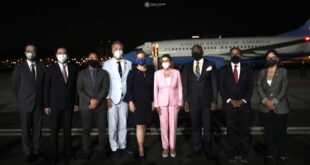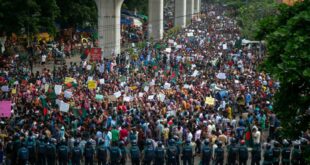As we advance and deepen this new Libyan National Dialogue, we are not merely discussing our country’s future—we are actively shaping it.
In the wake of a tumultuous decade marked by conflict and division, Libya stands on the brink of a promising new chapter. Earlier this year, responding to an overwhelming call from my fellow countrymen and women, and given the crippling stalemate that has characterized the UN-led mission established in 2011 to bring peace and stability to Libya, I initiated a series of nation-wide consultations as a path towards building an accurate and representative national dialogue. This effort constitutes the first-ever inclusive, non-sectarian, and entirely Libyan-led endeavor in our nation’s modern history since its independence in 1951. It also represents a pivotal moment when Libyans from all walks of life have a genuine chance to assert their sovereign and inalienable right to shape their destiny, uniting to forge a brighter future for our beloved homeland and its children.
Over the past months, these discussions have transcended the country’s internal divides, bringing together diverse voices and evidencing anew that the Libyan people are willing—and indeed able—to engage in meaningful exchange when given the proper opportunity to do so. Participants have included national political figures, local community leaders, city, municipal, and military authorities, tribal representatives, religious heads, minorities, labor unionists, youth activists, students, and academics. Each meeting and conversation, numerous details and photographs of which have been publicized online, propels us closer to a national consensus, driving the dialogue’s momentum forward in a manner that is as inspiring as it is irreversible.
One point of solid consensus that has emerged is the urgent need for this new and genuinely Libyan-led National Dialogue to carry on and to expand in the most appropriate format all across our homeland. For over a decade now, multiple international stakeholders have attempted—and ultimately failed—to reach an agreement among Libyans. But these initiatives were not Libyan-led, and partly for security reasons, they were almost entirely enacted outside Libya.
It is my deeply held conviction that no process of national dialogue can succeed unless it is Libyan-led, concluded on Libyan soil, and inclusive of all segments of Libyan society. Therefore, the next phase of this ambitious National Dialogue shall not only focus on broadening and intensifying our efforts with great determination but also anchor these discussions firmly in our homeland to bring this chapter of unimaginable suffering and chaos to an end and at last to set our beloved country on its righteous path to stability, prosperity, and a hopeful future.
A second area of significant convergence lies in the resolute belief that, after years of conflict, division, and failed political experimentation, the time has come to rediscover and embrace our shared Libyan national identity once more as the basis of any solution. This singular identity, steeped in a rich tapestry of history—from the days of the ancient Greeks and Romans to the Ottoman era to the struggle against Italian colonization and the Second World War, and the pivotal moments leading to our independence in 1951—is both our unifying force and our greatest strength.
In fact, in 1949, the first National Dialogue in our country’s modern history was launched. Through this momentous process, which drew on our own history, culture, and traditions, Libyans collectively and decidedly chose a democratic constitutional monarchy as their way forward to independence and beyond. This golden era, held under the cohesive power of the Independence Constitution, serves as a tribute to our ability to unite, self-govern, and thrive.
As we again engage in these most vital and urgent conversations of nation-building, a common aspiration arises: namely, to return to the principles and values on which the Independence Constitution was founded. These include patriotic duty, national responsibility, good ethics, transparency, tolerance, and inclusivity, and all remain central components of our cherished Libyan identity. This time-honored framework resonates profoundly with our national ethos and offers a beacon of hope for a well-governed, united Libya.
To our friends in the international community, we extend sincere gratitude for their past support, yet now convey our staunch commitment to charting our own autonomous path. We invite you to join us and contribute to this new comprehensive dialogue. This Libyan-led and inclusive movement is effectively more aligned with the Libyan people’s yearnings, free from the narrow internal and external interests that have spawned dysfunctionality and systemic domestic corruption.
To our neighbors, we extend a brotherly invitation to partake in Libya’s rebirth. A stable, peaceful, and flourishing Libya will not only bolster our own nation but also contribute significantly to the broader region’s safety and overall prosperity. In division, our weaknesses become your risks. But in unity, our thriving becomes your strength.
As we advance and deepen this new Libyan National Dialogue, we are not merely discussing our country’s future—we are actively shaping it. This process vastly surpasses a simple political endeavor; it stands as a renewal of our national spirit, a rekindling of hope, and a compelling testament to the resilience and unity of the Libyan people. Together, we stand at the dawn of a new era, ready to reclaim our destiny and rebuild a nation that honors our proud history, our diverse voices, and our collective aspirations. Long live a united Libya.
His Royal Highness Mohammed Senussi is the Crown Prince of Libya.
 Geostrategic Media Political Commentary, Analysis, Security, Defense
Geostrategic Media Political Commentary, Analysis, Security, Defense





